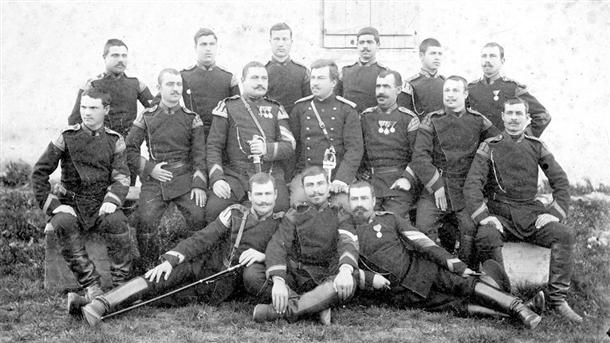

In March 2013, Bulgaria marks the 140th birth anniversary of Georgi Shagunov - a renowned composer and music pedagogue who had great contribution to the development of the Bulgarian military march song.
Georgi Shagunov was born in the town of Plovdiv in 1873. He graduated the French Catholic College in his native town. He started to play various music instruments since he was a child and studied music hard. His parents sent him to France when he was only 16 years old where he continued his education. They hoped he would choose to study medicine there, but he chose music again. After he graduated the Saint Jean College in the town of Lion he joined the state music conservatory in Lion where he later graduated. He studied horn and cornet instruments, music theory and conductorship. Before he even graduated the conductor’s classes, he was appointed second bandmaster of the city brass orchestra in the town of Lion. He returned to Bulgaria in 1895 and became a military bandmaster. After he went through military orchestras in the towns of Plovdiv and Lom, he went to the Burgas military garrison where he occupied the position bandmaster of the 24th infantry Black Sea regiment. During the Balkan Wars he was a bandmaster of the 30th Shipka military regiment. Along with his active multiple performances in his professional field, he also took part in many civil initiatives. Some of the restored musical scores were performed in the coastal city of Burgas several months ago. Rumiana Emanuilidu who is an author of biographic books, an explorer and a great fan of Georgi Shagunov’s works talks before RB:
“I discovered an extremely colorful personality among many great people of this time. When I was studying the works of Shagunov, I came into contact with the biographies of many other renowned citizens of Burgas and learned a lot about life in our city. Music was an irrevocable part of the daily round and the family upbringing at that time. Georgi Shagunov started to compose at the age of 16. For half a century he created nearly 2000 music pieces. I can say he did a lot to the Bulgarian music culture.

Georgi Shagunov was very popular among his fellow townsmen and they loved him a lot. They often danced and had fun under the sounds of the city brass orchestra. He contributed a lot to the development of the city symphonic orchestra, the choirs and the construction of the Burgas opera house. Rumiana Emanuilidu tells us more:
“After a long search I managed to find some unknown pieces, written by Shagunov which are only a small part of his great creative work. His contemporaries used to call him the father of the Burgas music. Due to his active music work, the first music association and music schools were established in our city. He worked actively for the improvement of the music knowledge and culture of the members of his orchestra, of many young people and music fans. His exceptional ability to write music pieces was something that impressed me the most. A school brass orchestra was created at his initiative. With the help of musicians from the military orchestra and representatives of the Music Association, he created a hall orchestra which gained huge popularity in no time. Shagunov wrote many pieces for its repertoire in the spirit of the so-called urban music- waltz, tangos and foxtrots. He often conducted charity concerts and wrote pieces which were sold at tender bids. The money was used for the purchase of new music instruments and for the organizing of educational music courses. The bandmaster was the first teacher of brass instruments in the Burgas music school.”
All the waltzes which were written by the maestro bore female names- “The Small Anka”, (dedicated to his daughter), “Dochka”, “Violette”, “Mariyka Valtz”, etc. Shagunov entertained his fellow townsmen with his joyful poetry, accompanied by proper music. “We are the jolly vagrants…..our days are clean and light, just like our pockets”. This is a quote of one of his songs.

“I and the composer Kiril Donchev were dealing for nearly two years with archive materials linked with the creative work of our renowned fellow citizen”, Rumiana Emanuilidu goes on to say. “We restored many music scores and voices and we selected 14 patterns of the urban music. The Burgas brass orchestra performed these pieces on November 1, 2012 at a concert dedicated to the Day of the Bulgarian national revival leaders and the work of Georgi Shagunov. Maestro Kiril Donchev was a guest conductor of this show, which was his symbolic return to his native city. 50 years ago as a conductor of the brass orchestra, he was the one who restored the open air concerts in the Sea Garden- a tradition which was set by Georgi Shagunov. Mr Donchev keeps old memories of his renowned predecessor and he told me that he saw Shagunov many times when he was a child. The same program will be again shown to the audience in Burgas. The traditional festival of the brass orchestras which is held in May under the auspices of the city mayor is dedicated to the 100th anniversary of the Balkan wars as well as to the 140th birth anniversary of the bandmaster of the 24th infantry regiment, Colonel Georgi Shagunov. We should not forget that he created many wonderful military marches.”
According to Mrs Emanuilidu, many of the great marches left by maestro Shagunov have not been restored yet and are kept in the State Archives in Burgas. Although he was loved and appreciated by the citizens of Burgas, he was intentionally put into oblivion during the communist regime due to his marching songs where the name of the Bulgarian king was mentioned. This was the reason his wonderful piece called “Anthem of independence” remained unknown.
English version: Kostadin Atanasov